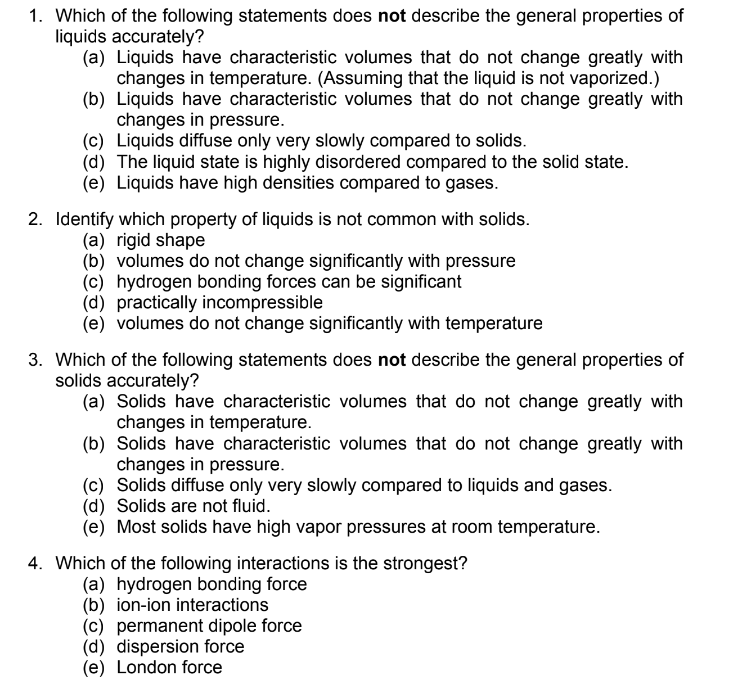1. Which of the following statements does not describe the general properties of liquids accurately? (a) Liquids have characteristic volumes that do not change greatly with changes in temperature. (Assuming that the liquid is not vaporized.) (b) Liquids have characteristic volumes that do not change greatly with changes in pressure. (c) Liquids diffuse only very slowly compared to solids. (d) The liquid state is highly disordered compared to the solid state. (e) Liquids have high densities compared to gases. 2. Identify which property of liquids is not common with solids. (a) rigid shape (b) volumes do not change significantly with pressure (c) hydrogen bonding forces can be significant (d) practically incompressible (e) volumes do not change significantly with temperature 3. Which of the following statements does not describe the general properties of solids accurately? (a) Solids have characteristic volumes that do not change greatly with changes in temperature. (b) Solids have characteristic volumes that do not change greatly with changes in pressure. (c) Solids diffuse only very slowly compared to liquids and gases. (d) Solids are not fluid. (e) Most solids have high vapor pressures at room temperature. 4. Which of the following interactions is the strongest? (a) hydrogen bonding force (b) ion-ion interactions (c) permanent dipole force (d) dispersion force (e) London force
1. Which of the following statements does not describe the general properties of liquids accurately? (a) Liquids have characteristic volumes that do not change greatly with changes in temperature. (Assuming that the liquid is not vaporized.) (b) Liquids have characteristic volumes that do not change greatly with changes in pressure. (c) Liquids diffuse only very slowly compared to solids. (d) The liquid state is highly disordered compared to the solid state. (e) Liquids have high densities compared to gases. 2. Identify which property of liquids is not common with solids. (a) rigid shape (b) volumes do not change significantly with pressure (c) hydrogen bonding forces can be significant (d) practically incompressible (e) volumes do not change significantly with temperature 3. Which of the following statements does not describe the general properties of solids accurately? (a) Solids have characteristic volumes that do not change greatly with changes in temperature. (b) Solids have characteristic volumes that do not change greatly with changes in pressure. (c) Solids diffuse only very slowly compared to liquids and gases. (d) Solids are not fluid. (e) Most solids have high vapor pressures at room temperature. 4. Which of the following interactions is the strongest? (a) hydrogen bonding force (b) ion-ion interactions (c) permanent dipole force (d) dispersion force (e) London force
Introductory Chemistry: An Active Learning Approach
6th Edition
ISBN:9781305079250
Author:Mark S. Cracolice, Ed Peters
Publisher:Mark S. Cracolice, Ed Peters
Chapter15: Gases,liquids, And Solids
Section: Chapter Questions
Problem 15.1TC
Related questions
Question
1,2,3 and 4

Transcribed Image Text:1. Which of the following statements does not describe the general properties of
liquids accurately?
(a) Liquids have characteristic volumes that do not change greatly with
changes in temperature. (Assuming that the liquid is not vaporized.)
(b) Liquids have characteristic volumes that do not change greatly with
changes in pressure.
(c) Liquids diffuse only very slowly compared to solids.
(d) The liquid state is highly disordered compared to the solid state.
(e) Liquids have high densities compared to gases.
2. Identify which property of liquids is not common with solids.
(a) rigid shape
(b) volumes do not change significantly with pressure
(c) hydrogen bonding forces can be significant
(d) practically incompressible
(e) volumes do not change significantly with temperature
3. Which of the following statements does not describe the general properties of
solids accurately?
(a) Solids have characteristic volumes that do not change greatly with
changes in temperature.
(b) Solids have characteristic volumes that do not change greatly with
changes in pressure.
(c) Solids diffuse only very slowly compared to liquids and gases.
(d) Solids are not fluid.
(e) Most solids have high vapor pressures at room temperature.
4. Which of the following interactions is the strongest?
(a) hydrogen bonding force
(b) ion-ion interactions
(c) permanent dipole force
(d) dispersion force
(e) London force
Expert Solution
This question has been solved!
Explore an expertly crafted, step-by-step solution for a thorough understanding of key concepts.
This is a popular solution!
Trending now
This is a popular solution!
Step by step
Solved in 2 steps

Knowledge Booster
Learn more about
Need a deep-dive on the concept behind this application? Look no further. Learn more about this topic, chemistry and related others by exploring similar questions and additional content below.Recommended textbooks for you

Introductory Chemistry: An Active Learning Approa…
Chemistry
ISBN:
9781305079250
Author:
Mark S. Cracolice, Ed Peters
Publisher:
Cengage Learning

Introductory Chemistry: A Foundation
Chemistry
ISBN:
9781337399425
Author:
Steven S. Zumdahl, Donald J. DeCoste
Publisher:
Cengage Learning


Introductory Chemistry: An Active Learning Approa…
Chemistry
ISBN:
9781305079250
Author:
Mark S. Cracolice, Ed Peters
Publisher:
Cengage Learning

Introductory Chemistry: A Foundation
Chemistry
ISBN:
9781337399425
Author:
Steven S. Zumdahl, Donald J. DeCoste
Publisher:
Cengage Learning


Chemistry
Chemistry
ISBN:
9781305957404
Author:
Steven S. Zumdahl, Susan A. Zumdahl, Donald J. DeCoste
Publisher:
Cengage Learning

Chemistry: An Atoms First Approach
Chemistry
ISBN:
9781305079243
Author:
Steven S. Zumdahl, Susan A. Zumdahl
Publisher:
Cengage Learning

Chemistry: Principles and Reactions
Chemistry
ISBN:
9781305079373
Author:
William L. Masterton, Cecile N. Hurley
Publisher:
Cengage Learning